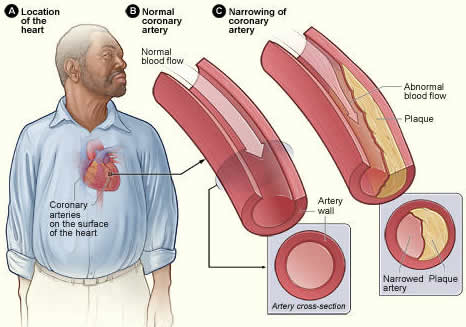How Does Cholesterol Affect the Body – More FAQs?
A waxy substance carried by lipoprotein through blood that can be bad for your blood flow if accumulated too much in the blood vessels is called cholesterol. Actually, not all types of cholesterol are bad for your body. HDL or High Density Lipoprotein is a kind of good cholesterol. Having high HDL is good because it can help control and lower your bad cholesterol (LDL). On the other side, getting increased of LDL can be harmful for your heart and cardiovascular system.
Though cholesterol is often associated with the increased risk of some medical health problems (such as heart disease and other cardiovascular diseases), but actually your body needs it to support some body’s functions. In appropriate level, cholesterol can help body continue building and making more healthy cells. Another activity in the body that involves cholesterol is the productions of vitamin D, certain hormones, and other substances to help digest foods.
But the body itself is able to make its own cholesterol. In other words, naturally your body doesn’t need any cholesterol from outside because it can produce all the cholesterol it needs.
In general, it’s perfectly normal for anyone to have cholesterol. The problem is when it raises higher than normal due to you stick with diet high in cholesterol and saturated fats – this can be harmful for your entire health, particularly for your membrane plasma and cardiovascular system.
As mentioned before, HDL is a kind of good cholesterol. Cholesterol can travel through your blood by attaching in a protein called lipoprotein. It is a cholesterol-protein package. The following are some types of cholesterol classified by how much fat is in relation to protein:
- Triglycerides. They may be less popular than HDL and LDL, but they also can affect your entire health. In general, they are a kind of fat carried in the blood by very low density lipoprotein. You can get triglycerides from excess sugar, calories, or alcohol. These triglycerides then will be stored in fat cells.
- VLDL (very low density lipoprotein). As the name implies, it is very low in protein and contains mostly fat.
- LDL (low density lipoprotein) or much familiar called as bad cholesterol. It is a kind of cholesterol that often plays a key role in causing buildup of plague in the blood vessels. Generally, doctors often say that higher LDL is worst and lower LDL is better for the health.
- HDL. It is the hero when it comes to controlling cholesterol. Unlike other types mentioned before, HDL can help lower your bad cholesterol. Therefore generally, higher HDL is better to reduce your risk of getting heart disease.
It’s important to keep having healthy levels of two major types of cholesterols (HDL and LDL). So, how does HDL control LDL?
HDL can help carry cholesterol from blood of any parts of your body back to the liver. And in the liver, the cholesterol can be removed from the body.
Therefore, if you have lower HDL, there will more cholesterol in the blood that cannot be removed optimally by the liver.
As well we know, it’s very important to have a good blood flow in the body. Blood carries lots of nutrients and oxygen that required by cells of the body. Having too high cholesterol can be bad for the blood flow of your body.
And once your blood flow doesn’t work as well as it should be, there will be lots of problems that occur.
The high accumulation of cholesterol in the blood vessel can create plaque builds up. These builds up can obstruct the blood to flow inside the blood vessel, because the diameter of blood vessels (particularly for arteries, blood vessels that carry blood away from your heart) will be narrowed.
As a result, this can affect the way of your heart in pumping the blood all around the body and your heart will work harder. Below is a helpful image (credit to the National Institutes of Health) that describes the differences between normal artery and narrowing of artery:
The picture above tells you that cholesterol can narrow the diameter of your blood vessel. Cholesterol is not the single element of those builds up. Excessive fat and other substance in the blood also can have contribution in causing plague builds up inside the blood vessels.
Arteries are the most common blood vessels where builds up due to the accumulation of high cholesterol occur. These builds up can harden over time, and if left untreated this can be harmful for your heart and cardiovascular system.
The builds ups on the walls of arteries due to the accumulation of unfriendly deposits such as cholesterol can lead to a medical condition called arthrosclerosis (narrowing and hardening blood vessels).
Arthrosclerosis can significantly affect the blood flow inside the blood vessels. If left untreated, it can be potential to cause the following complications:





